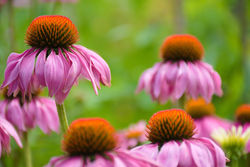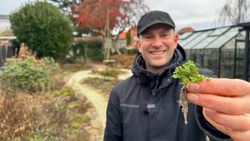Does gardening reduce anxiety?
- Lars Wildes
- Jan 3, 2023
- 5 min read
Updated: Jan 4, 2023
If you’ve ever taken a walk in nature and felt instantly relaxed, then you know that plants can soothe and restore our minds. But did you know that growing plants can also help reduce stress and anxiety?
For centuries, people have used gardening to reduce stress and anxiety. It's no surprise that gardening can have a calming effect; the repetitive motion of planting, weeding, and harvesting can be quite soothing. Especially when it’s done as a hobby.
Studies have shown that interacting with plants can help lower cortisol levels and induce feelings of peace and relaxation.
Plus, there’s something about getting your hands dirty that just makes you feel better.
Let’s take a look at how growing plants can help reduce anxiety.

The science behind gardening and anxiety reduction
Gardening is about more than just growing plants and flowers; it also provides psychological benefits.
For starters, gardening helps lower cortisol levels in the body compared to non-gardeners. Cortisol is a hormone released when we’re stressed or anxious. If it gets too high, you can experience headaches, muscle tension, high blood pressure, and even memory impairment.
Gardening also increases serotonin levels — the neurotransmitter responsible for regulating mood — as well as dopamine, which plays a role in controlling pleasure responses.
Studies show that spending time in green spaces helps to reduce stress levels. The simple act of being in nature has been shown to lower blood pressure and heart rate while increasing feelings of contentment and well-being.
In a study in the International Journal of Environmental Research and Public Health, anxiety-suffering participants lowered their levels of anxiety with as little as 8 hours of gardening in just 2 weeks.
The Royal College of Physicians in the UK recommends that health professionals encourage their patients to make use of green spaces and work in gardens.
They even go as far as to say that local authorities should increase open spaces and the number of trees in the country.
Other studies suggest that gardening may help those suffering from depression or anxiety disorders by providing an outlet for creative expression and promoting feelings of accomplishment as plants grow due to their care.
Even just getting your hands dirty and working with the soil in your garden can help regulate your emotions and immune response.
This is because of the soil microbes and the key role they play in everything from the nutrient content of our food to the chemicals they manufacture (phytonutrients or antioxidants).
Research shows that these same chemicals benefit people by stimulating our immune system, regulating our hormones, and slowing the growth of human cancer cells.
Just by tending to your garden or planting new perennials in an outdoor container, you’re improving your mental (and physical) health without even realizing it.

Gardening and mindfulness
Gardening also promotes mindfulness — the practice of living in the moment without judgment — which has been proven to help manage symptoms of anxiety and depression.
Mindfulness allows us to appreciate our environment while connecting with ourselves on a deeper level. And there's no better place to practice mindfulness than with the flowers and herbs in your very own garden!
To me, gardening gives us something else to focus on when everyday worries start creeping up. There’s something so rewarding about nurturing plants from seedlings into strong, healthy specimens. It’s a much-needed distraction when life starts getting overwhelming.
The benefits of plant therapy
Ask any gardener and they’ll tell you the same — Gardening is an ideal way to “get away from it all".
The best part is that just 30 minutes of gardening can make a huge difference in your mental health. Not only does gardening get you out into nature, but it also provides a sense of accomplishment when you see the results of your hard work. Plus, it doesn’t hurt that flowers are beautiful!
Think of it as plant therapy.
Plants are also known for their air-purifying capabilities — they absorb toxins from the air and produce oxygen in return. This helps create a more comfortable environment for both people and animals alike, which can often lead to improved moods.
And if that wasn’t enough, being around green foliage has also been linked to sharper cognitive function and decreased risk of stress-related illnesses like depression or heart disease.
One study found that exposure to greenspaces could improve processing speed and attention and boost overall cognitive function.
How? The results pointed to lower levels of depression and supported previous research linking exposure to parks, community gardens, and other greenery with improved mental health.
Getting started with plant therapy
Growing plants may seem like an intimidating proposition at first glance, but it doesn’t have to be.
Even if you don't have an outdoor space, there are plenty of ways to reap the benefits of plant therapy indoors as well.
If you’re feeling overwhelmed by life and want to start taking advantage of the calming power of plants, here are some beginner-friendly tips on how to get started:
Start small — You don’t need an entire garden full of flowers right away! A few simple potted plants will do just fine (and they make great gifts too). Perennials are easy plants to start with and they’ll keep coming back year after year.
Get creative — Try planting something unusual or unexpected like succulents or herbs.
Have fun — Add some color with handmade pots or accessories like bird baths or wind chimes.
Get outside — Take breaks from your indoor garden to go explore nature trails or visit local greenhouses for inspiration. Just visiting your local garden center can have some of the same anxiety-lowering power of working in your own garden.
Make it social — Have friends over for a coffee in your garden or join a local gardening club for support and advice.
The most important thing to remember is to give yourself permission to take some time out for yourself today by getting lost in the beauty of nature — one plant at a time.

What kind of plants should I grow?
Any plant will do!
But if you want to maximize your anxiety-relieving benefits, consider growing something with edible fruit or vegetables.
Not only does tending these plants help relieve anxiety but once they’re ready for harvest, you can enjoy their fruits (literally!).
Plus, having homegrown food on hand is always a plus since grocery stores tend to run out of certain items during high-demand periods.
Some easy-to-grow fruit and vegetable plants include tomatoes, peppers, cucumbers, squash, beans, strawberries, raspberries, and blueberries — all of which can provide stress relief benefits as well as tasty treats.
Feeling overwhelmed? You’re not alone. In this day and age, it can feel like there are a million things to do in a day and not enough time to do them. But thankfully, you can find relief just by taking a stroll outside or digging in the dirt.
Gardening isn't just about getting your hands dirty; it's about creating beauty from chaos and finding peace in nature.
Not only does tending your garden promote physical activity but it can also have positive effects on your mental well-being. It's no wonder why gardening is such a popular pastime — cultivating plants brings us closer to nature and helps reduce stress levels at the same time.
Whether you're an avid gardener or just starting out, cultivating plants could be exactly what you need for reducing anxiety levels.
So get out there and get your hands dirty! Your mental health will thank you for it.









Comments